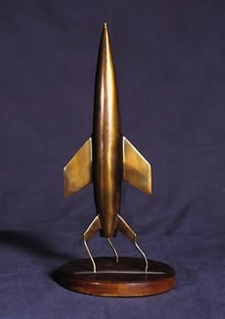After 1955 and 1956 lulled me into a false sense of complacency—with me thinking that I could see in the Hugo Awards of those years the beginnings of the award I know today—1957 took me by surprise. The Worldcon that year was in London, Loncon 1, the first overseas Worldcon. And British fans clearly decided to do something different with the Hugos. Something really different. Something indeed that makes no sense to me.
There were three categories for the Hugos of 1957, and none of them were fiction.
They were Best U.S. Magazine, Best British Magazine, and best Fan Magazine. I suppose this might reflect the prevailing view that magazines were where it was at, as well as British fans being unable to get hold of U.S. books easily—which was a problem until 1994. But it must also reflect a belief that it isn’t the stories that matter, it’s where you read them.
However, they did have nominees, so that’s a good sign for next week, when this is all going to get so much easier.
Best American Magazine: Astounding, John W. Campbell. (Anybody surprised?)
Nominees: F&SF, Anthony Boucher—the only magazine on the list still going under its original name.
Galaxy, H.L. Gold. Galaxy was also a great magazine.
Infinity, Larry T. Shaw. Not such a well-known magazine, at least now, but they published Clarke’s The Star the year before so they were doing something right.
Best British Magazine: New Worlds, John Carnell.
Nominees: Nebula, Peter Hamilton.
Britain had two science fiction magazines? Why didn’t I know this? Perhaps because it was before I was born.
Fan Magazine: Science Fiction Times, James V. Taurasi, Ray Van Houten & Frank R. Prieto Jr.
Nominees: Hyphen, Walt Willis and Chuck Harris—which was robbed, I tell you, those old Hyphens were golden.
Inside, Ron Smith.
Other categories they might have had
Well, they could have thought about novels, you know? Short fiction?
The International Fantasy Award went to The Lord of the Rings, presumably considered as one thing. The International Fantasy Award then expired, presumably considering that with the publication of The Lord of the Rings, fantasy was now over.
Again using Wikipedia’s listing of novels published in 1956, they might have considered:
Arthur C. Clarke’s The City and the Stars (post), John Christopher’s The Death of Grass (a cosy catastrophe), Frank Herbert’s The Dragon in the Sea (claustrophobic futuristic undersea adventure), Philip Dick’s The Man Who Japed and The World Jones Made (I don’t like Dick, but lots of people do), Isaac Asimov’s The Naked Sun (sequel to The Caves of Steel, one of Asimov’s best), A.E. Van Vogt’s The Players of Null A (aka The Pawns of Null A, book 2), Frederik Pohl’s Slave Ship, Alfred Bester’s The Stars My Destination (aka Tiger, Tiger), C.S. Lewis’s Till We Have Faces (a weird fantasy based on Cupid & Psyche).
Or in YA, which people then did not nominate for Hugos but people now do: C.S. Lewis’s The Last Battle, Asimov’s Lucky Starr and the Big Sun of Mercury, Eleanor Cameron’s Stowaway to the Mushroom Planet, and Heinlein’s Time For the Stars (post).
I think out of all that, they might have been able to find something Hugo-worthy, don’t you? There were some great books published in 1956, even if it wasn’t quite as vintage a year as 1955. I think I’d have been torn between The City and the Stars and The Naked Sun, but The Stars My Destination is also terrific, and I’m very fond of Time for the Stars.
What an odd year. What a relief it will be to get to 1958, when, perhaps in reaction, they finally started doing things properly!
Jo Walton is a science fiction and fantasy writer. She’s published eight novels, most recently Lifelode, and two poetry collections. She has a ninth novel coming out in January, Among Others, and if you liked this post you will like it. She reads a lot, and blogs about it here regularly. She comes from Wales but lives in Montreal where the food and books are more varied.










